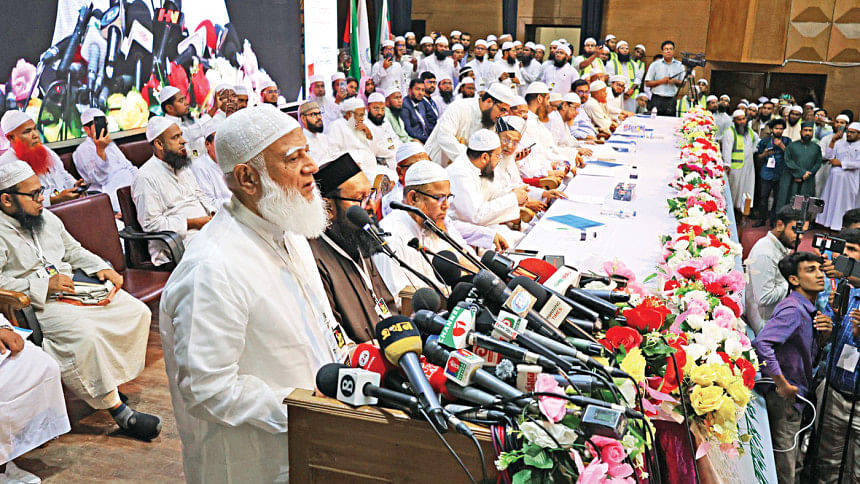‘Abolish Women’s Affairs Reform Commission’

Islamist parties under the banner of Jatiya Olama Mashayekh Aemma Parishad yesterday demanded immediate abolition of the Women's Affairs Reform Commission.
They also rejected the recommendations of the commission and called for a new commission comprising "pious, educated, and socially conscious women who truly represent the country's female population".
Expressing concern, they said the government had taken comprehensive reform initiatives to cleanse the remnants of past autocratic rule, a step supported by the public, and some commissions, like the Constitution Reform Commission, reflected commendable intentions.
However, speakers said the recommendations made by the Women's Affairs Reform Commission are contrary to, what they say, the nation's beliefs, values, and traditions, and have directly hurt religious sentiments.
The speakers claimed that many of the commission's recommendations are inspired by Western ideologies and contradict Bangladesh's social realities and the true needs and struggles of the country's women.
Addressing the event held at the Diploma Engineers' Institution, Shafiqur Rahman, ameer of Bangladesh Jamaat-e-Islami, said the entire commission and its recommendations must be rejected.
"We don't want a movement, but if forced, we won't hesitate to take to the streets," he warned.
Criticising what he called contradictions in the commission's approach, he said, "On one hand, they talk about equal rights, and on the other, they push for women's quotas everywhere. If rights are equal, why the need for quotas? Let women earn positions based on merit, not reservation."
Threatening the government not to move forward with the recommendations, Mamunul Haque, ameer of Bangladesh Khelafat Majlish, said, "If the government tries to implement even a single part of the commission's recommendations, it will have to do so over our dead bodies."
He alleged the reform proposals were part of a foreign agenda, and criticised the Chief Adviser's Office for quickly announcing its intention to implement them.
Mamunul said they have not seen such urgency for the recommendations of any other commissions, and suggested this was a pre-planned conspiracy, with involvement of the highest level.
At the event, speakers claimed that instead of addressing the issues of women who fall into prostitution due to trafficking, sexual abuse, and poverty, the commission has attempted to legally recognise prostitution as a profession, thereby legitimising a "cursed life for women".
Speakers also said Bangladesh's family laws have long been religion-based and there has been no major public dissatisfaction. They claimed that the women's reforms commission is attempting to abolish this religious foundation and impose a religion-neutral family structure.
They warned that this may provoke the religious populace and mirrors the recent strategy of social division used by India's BJP, and that such proposals would provoke public outrage and create an opening for "reactionary fascism" to resurface.
Mufti Syed Muhammad Rezaul Karim, ameer of Islami Andolon Bangladesh, said he wanted to remind the government that it was not elected by the people, but was formed as the outcome of the sacrifice of thousands who were killed or wounded.
"We have always been with you and are still with you. We urge you to keep this in mind so that the fascists and opportunists cannot take advantage by bringing us face to face on the streets," he said.
The seminar was presided over by Nurul Huda Fayezi, president of Jaitya Olama, Mashayekh Aemma Parishad while Mufti Abdullah Masum presented the keynote speech.

 For all latest news, follow The Daily Star's Google News channel.
For all latest news, follow The Daily Star's Google News channel. 



Comments